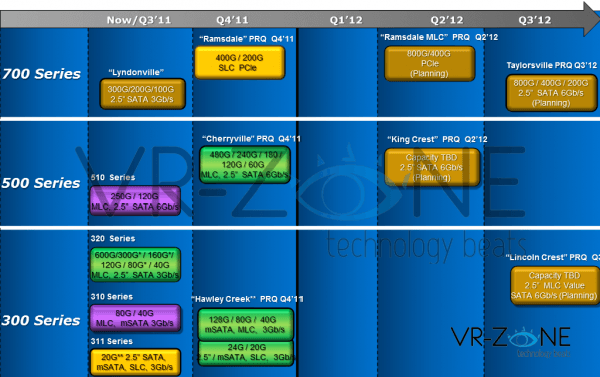VR-Zone has published a roadmap that reveals Intel's next wave of SSDs. Although the company hasn't taken the market by storm as it did with the X25 in 2008 and 2009, 2011 has been a seemingly fruitful year for Intel. It has launched or otherwise unveiled half a dozen flash-based products, including the 310 (Soda Creek), 311 (Larsen Creek), 320 (Postville Refresh), 510 (Elmcrest), 710 (Lyndonville) and 720 (Ramsdale) Series.
The 700 Series drives are geared toward enterprise customers with more durable MLC-HET and SLC NAND flash memory. Ramsdale connects via PCIe and offers higher capacities than your typical consumer drive, but isn't available yet – it should ship before the year is over. Likewise, Intel is prepared to close 2011 with a few new end user offerings we haven't heard too much about, codenamed Hawley Creek and Cherryville.
The former will reside in the 300 Series and will come in 40GB, 80GB and 120GB MLC capacities in an mSATA 3Gb/s package as well as 20GB and 24GB SLC variants. The latter will launch as part of the 500 Series and will come in five sizes spanning 60GB to 480GB with MLC NAND and a 6Gb/s interface. Things will die down as we roll into 2012. If the roadmap is accurate, Intel has nothing prepared for the first quarter of the year.

However, the second quarter will bring at least two new entries. The 700 Series will receive an MLC version of the PCIe Ramsdale drive called "Ramsdale MLC." It will connect via PCIe like its SLC-based sibling, but it'll double the previous capacities at 400GB and 800GB. Around the same time, the 500 Series will get "King Crest," another 2.5-inch SATA 6Gb/s offering, though no sizes or other information is currently available.
Later in the year, Intel will introduce another 700 Series drive dubbed "Taylorsville," which will come in a 2.5-inch form factor like Lyndonville, use SATA 6Gb/s and offer 200GB, 400GB as well as 800GB sizes. The third quarter of 2012 will also produce "Lincoln Crest," a 300 Series value-oriented 6Gb/s drive with MLC NAND. Based on that schedule, it seems like Intel is shooting for an annual SSD refresh akin to its CPU cycle.